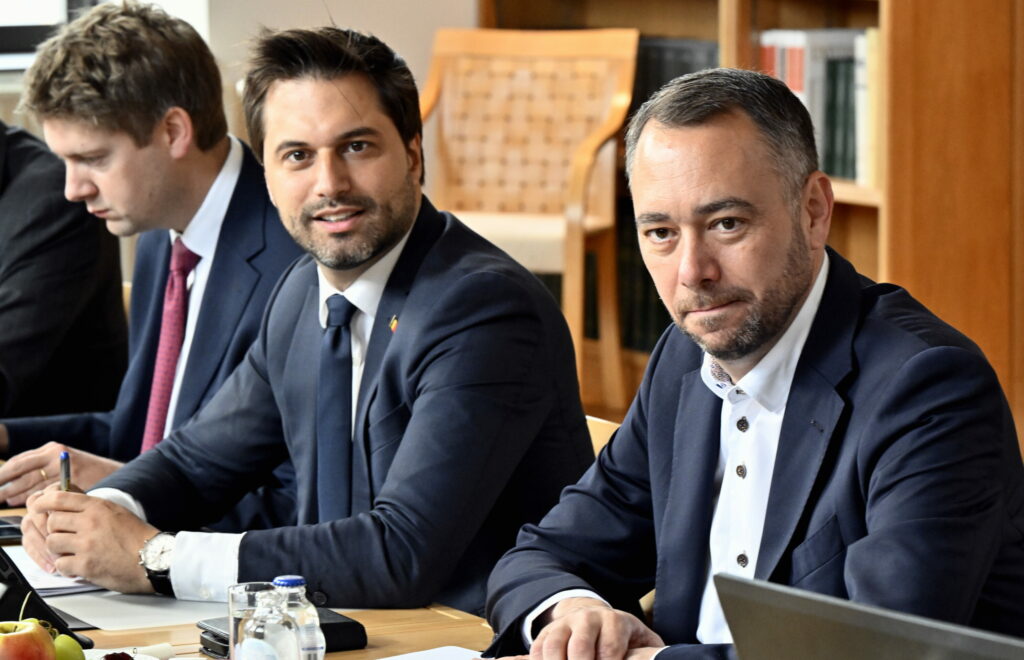Business groups and trade unions kicked off the first day of consultations with leaders of Mouvement Réformateur (MR) and Les Engagés on Monday – having even invited Flemish business groups to the table.
The two Francophone parties are set to meet with a wide range of society representatives over eight days as part of the Walloon Government formation process.
Off the back of their electoral success, MR leader Georges-Louis Bouchez and his counterpart from Les Engagés Maxime Prévot are meeting with more than 250 organisations over the next eight days, as they plan the formation of governments for Wallonia and the Wallonia-Brussels Federation (which represents the French speaking community of Belgium).
A spokesperson for the French-speaking Union of Middle Classes (UCM), which represents more than 130,000 independents and 30,000 companies across Wallonia and Brussels, said that Monday's meeting went "very well", and that it was a "good opportunity to exchange views and reassure the self-employed and SMEs".
They added that issues raised included job shortages, simplifying administrative burdens, taxation, and the challenges of artificial intelligence (AI). The future role of Le Forem (the Walloon Government employment agency) in work-linked training was also discussed, as were setting the new priorities for Wallonia's Recovery Plan (first introduced in 2021 to guide the Walloon Government's actions across employment, the economy, the environment and climate).
In general employers at the meeting on Monday expressed their desire for administrative simplification, sought support for their initiatives and the activation of job seekers, and asked for a balanced approach to sanctions.
As reported by Belga, general secretary at the Neutral Syndicate for Independents (SNI) Christophe Wambersie said the meeting was constructive, and focused on reinventing Wallonia with a focus on the value of work. He said key matters raised by SNI were the need to have distinct policies for SMEs and large corporations, as well as discussing the social status and pensions 0f independent workers.
Meanwhile Vanessa Biebel, operational director at the Federation of Belgian Businesses (FEB), emphasised the need to form a Walloon Government quickly, to facilitate the speedy implementation of economic and social measures.
"For our federation, it's essential that the next Walloon Government focuses on enhancing cooperation between different power levels, activating the job market, administrative simplification and ratifying trade agreements at European and global level," she said.
Improving economic links between Wallonia and Flanders
A number of Flemish business organisations made an appearance on Monday, with aspirations to improve economic co-ordination between Wallonia and Flanders during the next government term.
The Union of Independent Entrepreneurs (UNIZO), which represents 110,000 members across Flanders and Brussels, said that it put forward a number of priorities during the meeting to improve economic and commercial co-operation.
"Wallonia has many assets (such as available and affordable space to do business, or active SMEs) to attract Flemish entrepreneurs, but they are unknown or disregarded," said UNIZO CEO Danny Van Assche, who added that the meeting on Monday with business organisations from both regions feels like the start of a "positive wind of change".
He added that there is a need for better inter-regional labour mobility between the two regions.
"Le Forem has to work much better and cooperate more with the VDAB [the equivalent public employment service for Flanders]. On top of that, there has to better access by public transport across the language border. Walloons have to get to Flanders more easily via public transport to work," he said.
Flemish business network Voka represents 18,000 members, and was also present on Monday. Among the proposals it suggested to Francophone party leaders were the need to more actively exchange vacancies and job seekers between Wallonia and Flanders, invest in cross-border energy and transport infrastructure, implement an R&D focused industrial policy in Wallonia and minimise administrative burdens.
Unions want 'quality'
As reported by Belga, FGTB (Belgian General Labour Federation) General-Secretary Jean-François Tamellini expressed fears of job insecurity, saying that the union's priority is "quality employment".
Speaking after the parliamentary meeting on Monday, MR leader Georges-Louis Bouchez said that trade unions should be "agents of change" in Wallonia, rather than blocking progress. He said that reform is needed in Wallonia, including how job seekers are activated and how public funds are spent.
Concerning the previous government's regional recovery plan, Bouchez told union representatives that the plan will be revised and tightened up to focus on key projects and programmes that will benefit Wallonia.
Les Engagés leader Maxime Prévot emphasised their commitment to maintaining social dialogue, seeing unions as "partners in the success of the next Walloon Government."
Bouches and Prévot will be meeting with representatives from across civil society, including economic, social, health, sport and cultural stakeholders, until Thursday 27 June.

